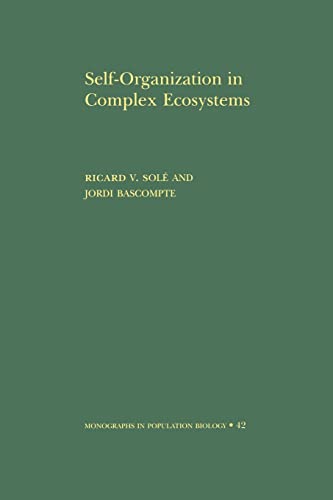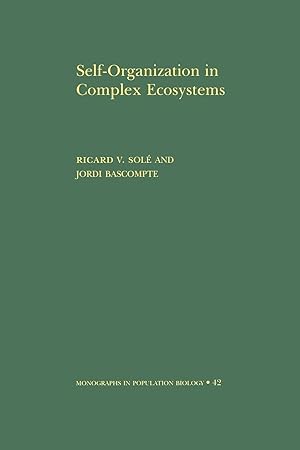self organization complex ecosystems de solé ricard (15 resultados)
Filtros de búsqueda
Tipo de artículo
- Todos los tipos de productos
- Libros (15)
- Revistas y publicaciones (No hay ningún otro resultado que coincida con este filtro.)
- Cómics (No hay ningún otro resultado que coincida con este filtro.)
- Partituras (No hay ningún otro resultado que coincida con este filtro.)
- Arte, grabados y pósters (No hay ningún otro resultado que coincida con este filtro.)
- Fotografías (No hay ningún otro resultado que coincida con este filtro.)
- Mapas (No hay ningún otro resultado que coincida con este filtro.)
- Manuscritos y coleccionismo de papel (No hay ningún otro resultado que coincida con este filtro.)
Condición Más información
- Nuevo (11)
- Como nuevo, Excelente o Muy bueno (3)
- Bueno o Aceptable (1)
- Regular o Pobre (No hay ningún otro resultado que coincida con este filtro.)
- Tal como se indica (No hay ningún otro resultado que coincida con este filtro.)
Encuadernación
- Todas
- Tapa dura (No hay ningún otro resultado que coincida con este filtro.)
- Tapa blanda (15)
Más atributos
- Primera edición (No hay ningún otro resultado que coincida con este filtro.)
- Firmado (No hay ningún otro resultado que coincida con este filtro.)
- Sobrecubierta (No hay ningún otro resultado que coincida con este filtro.)
- Con imágenes (8)
- No impresión bajo demanda (13)
Idioma (1)
Precio
- Cualquier precio
- Menos de EUR 20 (No hay ningún otro resultado que coincida con este filtro.)
- EUR 20 a EUR 45
- Más de EUR 45
Gastos de envío gratis
Ubicación del vendedor
Valoración de los vendedores
-
Self-Organization in Complex Ecosystems. (MPB-42) (Monographs in Population Biology) (Monographs in Population Biology (42))
Publicado por Princeton University Press, 2006
ISBN 10: 0691070407 ISBN 13: 9780691070407
Idioma: Inglés
Librería: HPB-Red, Dallas, TX, Estados Unidos de America
EUR 50,04
EUR 3,25 gastos de envío en Estados Unidos de AmericaCantidad disponible: 1 disponibles
Añadir al carritoPaperback. Condición: Good. Connecting readers with great books since 1972! Used textbooks may not include companion materials such as access codes, etc. May have some wear or writing/highlighting. We ship orders daily and Customer Service is our top priority!
-
Self-Organization in Complex Ecosystems
Publicado por Princeton University Press, Princeton, N.J., 2006
ISBN 10: 0691070407 ISBN 13: 9780691070407
Idioma: Inglés
Librería: Good Reading Secondhand Books, Benalla, VIC, Australia
EUR 35,09
EUR 25,16 gastos de envío desde Australia a Estados Unidos de AmericaCantidad disponible: 1 disponibles
Añadir al carritoSoft cover. Condición: Near Fine. The book has been covered in contact and there is an ownership signature on the front end paper and front paste down, else clean,solid and unmarked. xiv, 371 pages indexed. No 42 in Monographs in Population Biology edited by Simon A Levin and Henry S. Horn. " Can physics be an appropriate framework for the understanding of ecological science? Most ecologists would probably agree that there is little relation between the complexity of natural ecosystems and the simplicity of any example derived from Newtonian physics. Though ecologists have long been interested in concepts originally developed by statistical physicists and later applied to explain everything from why stock markets crash to why rivers develop particular branching patterns, applying such concepts to ecosystems has remained a challenge. Self-Organization in Complex Ecosystems is the first book to clearly synthesize what we have learned about the usefulness of tools from statistical physics in ecology. Ricard Sole and Jordi Bascompte provide a comprehensive introduction to complex systems theory, and ask: do universal laws shape the structure of ecosystems, at least at some scales? They offer the most compelling array of theoretical evidence to date of the potential of nonlinear ecological interactions to generate nonrandom, self-organized patterns at all levels.Tackling classic ecological questions--from population dynamics to biodiversity to macroevolution--the book's novel presentation of theories and data shows the power of statistical physics and complexity in ecology. Self-Organization in Complex Ecosystems will be a staple resource for years to come for ecologists interested in complex systems theory as well as mathematicians and physicists interested in ecology." (back cover) CONTENTS: Complexity in ecological systems Nonlinear dynamics Spatial self-organization: from pattern to process Scaling and fractals in ecology Habitat loss and extinction thresholds Complex ecosystems: from species to networks Complexity in macroevolution.
-
Self-Organization in Complex Ecosystems
Publicado por Princeton University Press, 2006
ISBN 10: 0691070407 ISBN 13: 9780691070407
Idioma: Inglés
Librería: GreatBookPrices, Columbia, MD, Estados Unidos de America
EUR 85,73
EUR 2,29 gastos de envío en Estados Unidos de AmericaCantidad disponible: 1 disponibles
Añadir al carritoCondición: New.
-
Self-Organization in Complex Ecosystems. (MPB-42) (Monographs in Population Biology, 42)
Publicado por Princeton University Press, 2006
ISBN 10: 0691070407 ISBN 13: 9780691070407
Idioma: Inglés
Librería: BennettBooksLtd, San Diego, NV, Estados Unidos de America
EUR 81,88
EUR 6,03 gastos de envío en Estados Unidos de AmericaCantidad disponible: 1 disponibles
Añadir al carritopaperback. Condición: New. In shrink wrap. Looks like an interesting title!
-
Self-Organization in Complex Ecosystems (Monographs in Population Biology, 42)
Publicado por Princeton University Press, 2006
ISBN 10: 0691070407 ISBN 13: 9780691070407
Idioma: Inglés
Librería: Lucky's Textbooks, Dallas, TX, Estados Unidos de America
EUR 93,12
EUR 3,46 gastos de envío en Estados Unidos de AmericaCantidad disponible: Más de 20 disponibles
Añadir al carritoCondición: New.
-
Self-Organization in Complex Ecosystems
Publicado por Princeton University Press, 2006
ISBN 10: 0691070407 ISBN 13: 9780691070407
Idioma: Inglés
Librería: GreatBookPrices, Columbia, MD, Estados Unidos de America
EUR 100,16
EUR 2,29 gastos de envío en Estados Unidos de AmericaCantidad disponible: 1 disponibles
Añadir al carritoCondición: As New. Unread book in perfect condition.
-
Self-Organization in Complex Ecosystems
Publicado por Princeton University Press, US, 2006
ISBN 10: 0691070407 ISBN 13: 9780691070407
Idioma: Inglés
Librería: Rarewaves USA, OSWEGO, IL, Estados Unidos de America
EUR 105,06
Gratis gastos de envío en Estados Unidos de AmericaCantidad disponible: Más de 20 disponibles
Añadir al carritoPaperback. Condición: New. Can physics be an appropriate framework for the understanding of ecological science? Most ecologists would probably agree that there is little relation between the complexity of natural ecosystems and the simplicity of any example derived from Newtonian physics. Though ecologists have long been interested in concepts originally developed by statistical physicists and later applied to explain everything from why stock markets crash to why rivers develop particular branching patterns, applying such concepts to ecosystems has remained a challenge. Self-Organization in Complex Ecosystems is the first book to clearly synthesize what we have learned about the usefulness of tools from statistical physics in ecology. Ricard Sole and Jordi Bascompte provide a comprehensive introduction to complex systems theory, and ask: do universal laws shape the structure of ecosystems, at least at some scales? They offer the most compelling array of theoretical evidence to date of the potential of nonlinear ecological interactions to generate nonrandom, self-organized patterns at all levels.Tackling classic ecological questions--from population dynamics to biodiversity to macroevolution--the book's novel presentation of theories and data shows the power of statistical physics and complexity in ecology. Self-Organization in Complex Ecosystems will be a staple resource for years to come for ecologists interested in complex systems theory as well as mathematicians and physicists interested in ecology.
-
Self-Organization in Complex Ecosystems
Publicado por Princeton University Press, 2006
ISBN 10: 0691070407 ISBN 13: 9780691070407
Idioma: Inglés
Librería: GreatBookPricesUK, Woodford Green, Reino Unido
EUR 106,48
EUR 17,09 gastos de envío desde Reino Unido a Estados Unidos de AmericaCantidad disponible: 1 disponibles
Añadir al carritoCondición: New.
-
Self-Organization in Complex Ecosystems (Monographs in Population Biology, 42)
Publicado por Princeton University Press, 2006
ISBN 10: 0691070407 ISBN 13: 9780691070407
Idioma: Inglés
Librería: GoldBooks, Denver, CO, Estados Unidos de America
EUR 130,06
EUR 3,69 gastos de envío en Estados Unidos de AmericaCantidad disponible: 1 disponibles
Añadir al carritoCondición: new.
-
Self-Organization in Complex Ecosystems
Publicado por Princeton University Press, 2006
ISBN 10: 0691070407 ISBN 13: 9780691070407
Idioma: Inglés
Librería: GreatBookPricesUK, Woodford Green, Reino Unido
EUR 117,19
EUR 17,09 gastos de envío desde Reino Unido a Estados Unidos de AmericaCantidad disponible: 1 disponibles
Añadir al carritoCondición: As New. Unread book in perfect condition.
-
Self-Organization in Complex Ecosystems
Publicado por Princeton University Press, US, 2006
ISBN 10: 0691070407 ISBN 13: 9780691070407
Idioma: Inglés
Librería: Rarewaves USA United, OSWEGO, IL, Estados Unidos de America
EUR 106,49
EUR 43,38 gastos de envío en Estados Unidos de AmericaCantidad disponible: Más de 20 disponibles
Añadir al carritoPaperback. Condición: New. Can physics be an appropriate framework for the understanding of ecological science? Most ecologists would probably agree that there is little relation between the complexity of natural ecosystems and the simplicity of any example derived from Newtonian physics. Though ecologists have long been interested in concepts originally developed by statistical physicists and later applied to explain everything from why stock markets crash to why rivers develop particular branching patterns, applying such concepts to ecosystems has remained a challenge. Self-Organization in Complex Ecosystems is the first book to clearly synthesize what we have learned about the usefulness of tools from statistical physics in ecology. Ricard Sole and Jordi Bascompte provide a comprehensive introduction to complex systems theory, and ask: do universal laws shape the structure of ecosystems, at least at some scales? They offer the most compelling array of theoretical evidence to date of the potential of nonlinear ecological interactions to generate nonrandom, self-organized patterns at all levels.Tackling classic ecological questions--from population dynamics to biodiversity to macroevolution--the book's novel presentation of theories and data shows the power of statistical physics and complexity in ecology. Self-Organization in Complex Ecosystems will be a staple resource for years to come for ecologists interested in complex systems theory as well as mathematicians and physicists interested in ecology.
-
Self-Organization in Complex Ecosystems. (MPB-42) (Monographs in Population Biology)
Librería: Revaluation Books, Exeter, Reino Unido
EUR 138,85
EUR 14,24 gastos de envío desde Reino Unido a Estados Unidos de AmericaCantidad disponible: 2 disponibles
Añadir al carritoPaperback. Condición: Brand New. 373 pages. 9.00x5.75x0.75 inches. In Stock.
-
Self-Organization in Complex Ecosystems. (MPB-42)
Publicado por Princeton University Press, 2006
ISBN 10: 0691070407 ISBN 13: 9780691070407
Idioma: Inglés
Librería: Kennys Bookstore, Olney, MD, Estados Unidos de America
EUR 146,06
EUR 9,11 gastos de envío en Estados Unidos de AmericaCantidad disponible: Más de 20 disponibles
Añadir al carritoCondición: New. Deals with the usefulness of tools from statistical physics in ecology. This book provides an introduction to complex systems theory, and asks whether universal laws shape the structure of ecosystems. Tackling classic ecological questions, its presentation of theories and data focuses on the power of statistical physics and complexity in ecology. Series: Monographs in Population Biology. Num Pages: 384 pages, 112 line illus. 6 tables. BIC Classification: PSAF. Category: (P) Professional & Vocational; (U) Tertiary Education (US: College). Dimension: 229 x 152 x 20. Weight in Grams: 542. . 2006. Paperback. . . . . Books ship from the US and Ireland.
-
Self-Organization in Complex Ecosystems. (MPB-42)
Publicado por Princeton University Press, 2006
ISBN 10: 0691070407 ISBN 13: 9780691070407
Idioma: Inglés
Librería: moluna, Greven, Alemania
EUR 77,18
EUR 48,99 gastos de envío desde Alemania a Estados Unidos de AmericaCantidad disponible: Más de 20 disponibles
Añadir al carritoCondición: New. Dieser Artikel ist ein Print on Demand Artikel und wird nach Ihrer Bestellung fuer Sie gedruckt. Deals with the usefulness of tools from statistical physics in ecology. This book provides an introduction to complex systems theory, and asks whether universal laws shape the structure of ecosystems. Tackling classic ecological questions, its presentation .
-
Self-Organization in Complex Ecosystems
Publicado por Princeton University Press, 2006
ISBN 10: 0691070407 ISBN 13: 9780691070407
Idioma: Inglés
Librería: AHA-BUCH GmbH, Einbeck, Alemania
EUR 95,66
EUR 62,97 gastos de envío desde Alemania a Estados Unidos de AmericaCantidad disponible: 1 disponibles
Añadir al carritoTaschenbuch. Condición: Neu. nach der Bestellung gedruckt Neuware - Printed after ordering - Can physics be an appropriate framework for the understanding of ecological science Most ecologists would probably agree that there is little relation between the complexity of natural ecosystems and the simplicity of any example derived from Newtonian physics. Though ecologists have long been interested in concepts originally developed by statistical physicists and later applied to explain everything from why stock markets crash to why rivers develop particular branching patterns, applying such concepts to ecosystems has remained a challenge.Self-Organization in Complex Ecosystems is the first book to clearly synthesize what we have learned about the usefulness of tools from statistical physics in ecology. Ricard Solé and Jordi Bascompte provide a comprehensive introduction to complex systems theory, and ask: do universal laws shape the structure of ecosystems, at least at some scales They offer the most compelling array of theoretical evidence to date of the potential of nonlinear ecological interactions to generate nonrandom, self-organized patterns at all levels.Tackling classic ecological questions--from population dynamics to biodiversity to macroevolution--the book's novel presentation of theories and data shows the power of statistical physics and complexity in ecology. Self-Organization in Complex Ecosystems will be a staple resource for years to come for ecologists interested in complex systems theory as well as mathematicians and physicists interested in ecology.










